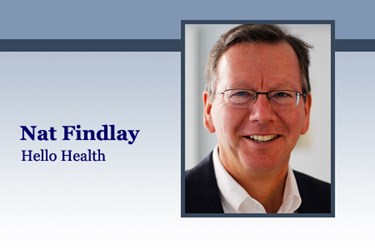Revisiting Lessons From The Past For Coordinated Care

By Nat Findlay, CEO, Hello Health
For those of us who remember conversations with our grandparents about how wonderful healthcare service and care were back in the day (as exemplified by Dr. Marcus Welby), it was unimaginable and near impossible to relate. As society races forward driven by ‘the need for now’ and the increasing push for technology to make life easier, the reality is — at least for the healthcare environment — it’s doing the opposite.
Certainly technology makes it easier to find the score of a game, but on matters like health and wellness, we have lost focus on what is important and if a smart phone is really making a difference related to improving lives or generating better clinical outcomes.
To remedy this, the notion of coordinated care continues to build momentum amongst the care providers who reside within the four walls of the hospital or private practice office. Yes, it seems silly to think the industry needs a term for this, but everyone needs to better understand what is truly in patients’ files (electronic or old-school paper) and further, we must be able to clearly articulate the needs and treatment recommendations of the patient. Sounds obvious right?
However, once the patient leaves the office, the opportunity to coordinate takes an interesting journey from beyond the four walls to the next important stop. Whether it’s the pharmacy, the home environment with the support of immediate or remote family, and even care given by co-workers/in the workplace setting, healthcare professionals must be able to know how their patient is progressing.
Practically speaking, the clinical expert who sees the patient is most often the pharmacist, at least that’s the hope if the patient is properly adhering to monthly medications requiring refills. Beyond that, the goal is to keep the patient healthy and thriving, without them returning to the four walls of the physician’s office, and never to the hospital ED setting unless truly necessary.
Improving The Lives Of Medicare Patients
Today’s seniors are sick. The amount of patients with two or more chronic conditions is staggering. Among Americans aged 65 years and older, as many as three out of four persons have multiple chronic conditions. Beyond the challenges of being sick, the real challenge is how well patients are able to follow medical directions and remain true to their physician’s orders. This is where coordinated care really hits home. Who is able to support and ensure patients are thriving in the non-clinical setting? Beyond the quality of care provided there are tremendous and real financial implications of the patient being happy and healthy.
For decades it has been known that preventing patients from needless visits to the emergency room would make a tremendous overall impact to curbing healthcare’s spiking costs. We know that when patients are able to access quality care, they are more confident in their abilities to care for themselves — or better able to articulate their needs to a home care provider or family member.
Medicare in 2015 may have created one of the most meaningful clinical programs in the past decade: Chronic Care Management or CPT Code #99490. This code provides physicians with the ability to be compensated for monthly telephone check-ins to understand how patients are doing between office visits, and to gauge patient confidence in their ability to follow key physician orders.
Beyond the short-term benefit of connecting with the patient, monthly check-ins really do fuel the collaborative care concept. With all gleaned information ending up in the EHR, a complete understanding of patient needs can be archived. So, instead of asking, “How have you been doing since your last visit?”, this insight can actually be assessed from these telehealth touch points. Beyond the importance to the PCP, there is better understanding of medication adherence — to support the pharmacist, better intelligence to provide the home health professional — or caring family member assuming a health proxy is in place. Considering the unfortunate upward trends of mental health issues, these comprehensive records and notes could be invaluable to a specialist who may need to be called in down the road.
Medicare wants to do what’s best for patient care and rarely has a new program been so effective in returning care to the caliber that it should be. It’s time to embrace the notion of home visits and monthly check ins — Dr. Marcus Welby-style — via the phone.
About The Author
Nathanial Findlay has held executive positions in the healthcare industry for more than 20 years. A veteran of successful start-ups as well as the Fortune 21 company Cardinal Health, Nat’s experience honed an entrepreneurial perspective and enthusiasm that inspired him to start Hello Health® in 2008. With a background also including accounting and law, Nat continues to work at the forefront of the evolution of modern primary healthcare. Nat’s mission is to use the Internet and mobile technology to redefine how patients interact with their physicians and manage their own health.
